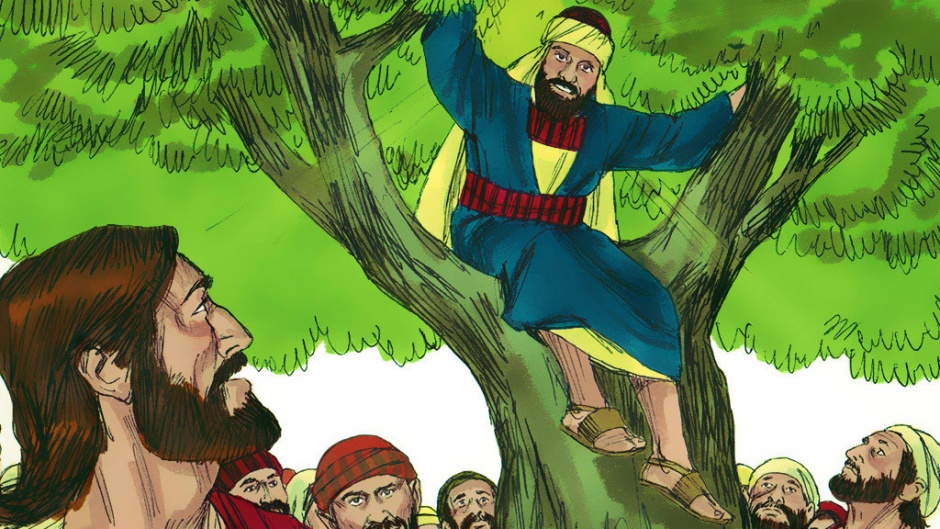Was Zacchaeus disabled? What can we learn from him?
Let us follow Jesus’ example and notice people for who they are, and then ask God to help us to be Jesus to them in the ways they need it most.
12 APRIL 2024 · 10:17 CET

Jesus is passing through Jericho, as he often did. He has just met Bartimaeus, a man who was blind, and to whom Jesus asks that vitally important question “What do you want me to do for you?”, a question that is relevant to all of us today whenever we are supporting a disabled person.
Bartimaeus says he wants to see, and Jesus gives him his sight.
Having entered Jericho, Jesus is greeted by a crowd. In Luke 19:1-10 we are introduced to one of them, a man named Zacchaeus.
We are told several things about Zacchaeus that mark him out as being different to the rest of the people there; he was a tax collector, he was wealthy, and he was short.
Being a tax collector would have marked him as being very unpopular, and his wealth, which was probably linked to his profession, would have earned him a reputation as a cheat and a swindler.
But what about his height? Why is this mentioned? In his time, the average height for a man was around 5’ 5” (about 1.65 metres), so for Zacchaeus’ height to be referenced here he must have been considerably shorter.
So short, indeed, that he couldn’t see to watch Jesus coming down the road and so climbs a sycamore fig tree.
Could Zacchaeus have had dwarfism (sometimes referred to as having short stature)?
Jesus didn’t treat Zacchaeus differently because of his short stature, he looked into his heart and soul, called out to him, saved him and transformed his life
Today, people with adult height of 4’ 10” (approx. 1.47m) can be described as having dwarfism or short stature, of which there are over 200 different types. Did Zacchaeus have one of these?If he did, and of course we can only speculate, then he would have faced all kinds of prejudice and exclusion, including being forbidden from serving in the temple (Leviticus 21:18).
His size would have marked him as imperfect, disabled, and therefore not acceptable to carry out priestly duties, had he wished or attempted to follow that calling.
But Jesus brings good news for everyone, including Zacchaeus. Through Jesus’ sacrifice on the cross, the temple curtain is torn asunder, access to God is open to all, and all are one in Christ Jesus (Galatians 3:28).
Jesus notices Zacchaeus up his tree and invites himself to Zacchaeus’ house (somewhat redolent of Revelation 3:20), and Zacchaeus responds to this gesture magnificently, making a hugely generous gift to the poor, while admitting his guilt and offering to repay four times over any who he has cheated. What a transformation!
Was Zacchaeus’ height, his possible dwarfism/short stature, relevant to the story?
Perhaps in that he was possible excluded by it (as well as his chosen profession and the way he conducted it), perhaps in that a grown man up a tree might have been more noticeable, perhaps because Luke, a doctor, felt it important enough to mention, then yes, it was relevant then, and perhaps now.
Jesus didn’t treat Zacchaeus differently because of his short stature, he didn’t talk to him like a child, or pity him, or ridicule him. He noticed Zacchaeus, he looked into Zacchaeus’ heart and soul, he called out to him, he saved him and transformed his life.
Zacchaeus wasn’t physically taller as a consequence of his encounter with Jesus, but he was a better man in the ways that mattered most.
Let us all be like Jesus, not judging someone by their appearance, or pitying them, or ridiculing them, but let us follow Jesus’ example and notice people for who they are, and then ask God to help us to be Jesus to them in the ways they need it most.
Mark Arnold, Director of Additional Needs Ministry at Urban Saints. Arnold blogs at The Additional Needs Blogfather. This article was re-published with permission.
Published in: Evangelical Focus - The Additional Needs Blogfather - Was Zacchaeus disabled? What can we learn from him?
